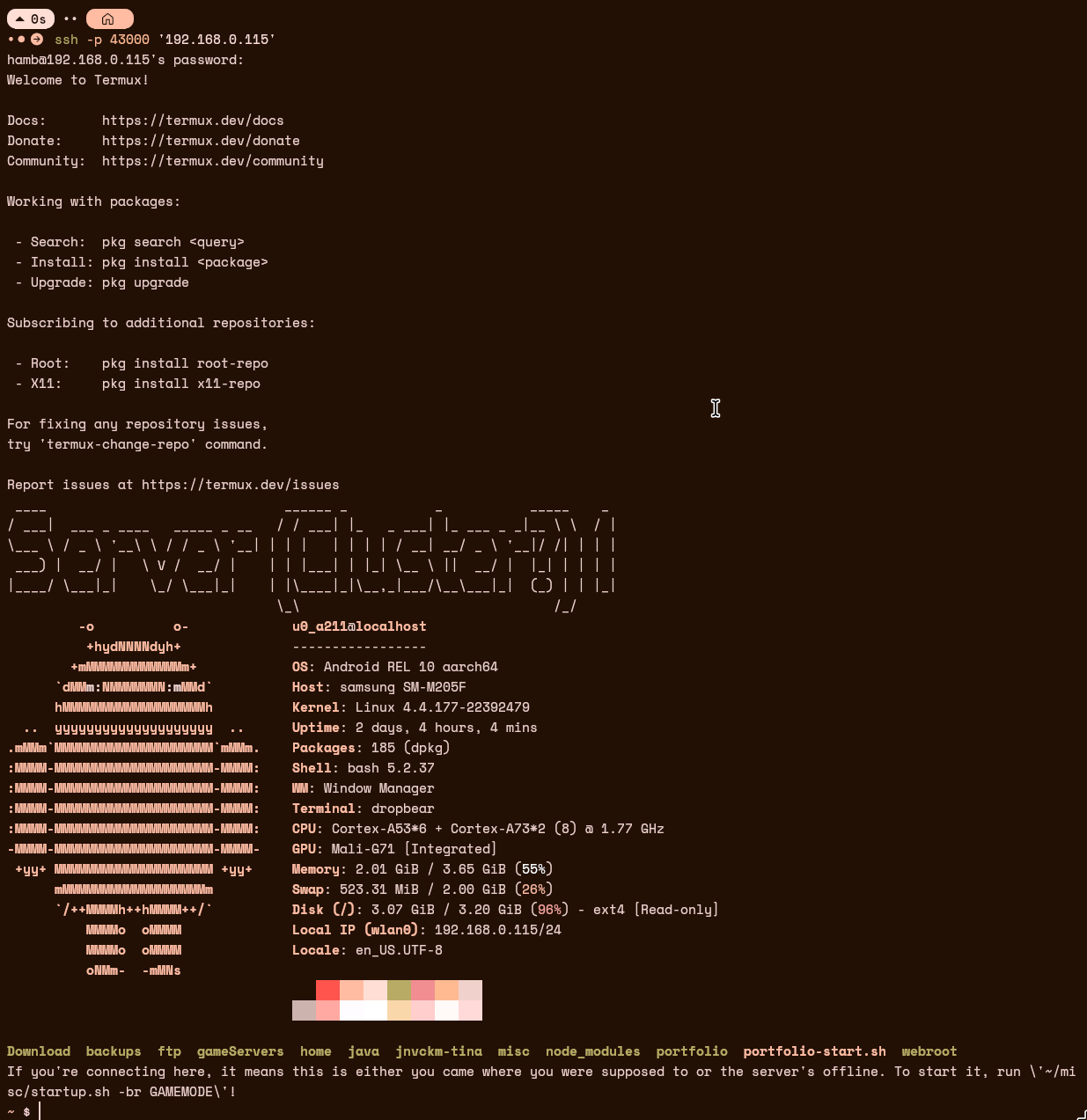Converting my Grandmother's Old, Broken phone into a server
How I converted my grandmother's old and broken phone into a (almost) fully functioning server.
Converting my Grandmother’s Old, Broken phone into a server
So, around January of 2025 I gifted my grandmother a new phone, since her old one was laggy and it’s touchscreen was broken However, the old phone worked perfectly fine so I decided to convert it to a linux server with Termux. Termux (not to be confused with terminal multiplexer tmux) is a linux terminal emulator built for android that allows you to use android tools such as nginx and java on an android phone through the CLI. So, here’s how I converted my grandmother’s phone to a webserver:

-
Step 1: After getting the phone, I factory reset it and cleaned it as much as I could. After that, I installed the F-droid store and installed Shizuku, Canta and Termux. I started Shizuku by turning on developer mode and sending the adb command once connected to my computer. After that, Canta could remove most of the Samsung Bloat with Shizuku Access. I did that, then opened termux, installed dropbear and made a script to execute
dropbear -p 43000so that I could connect to it through my laptop, thus making it much easier to configure and run. -
Step 2: After connecting through ssh, I installed python, nodejs, git, nginx, neovim and figlet using the command
pkg update && pkg upgrade && pkg install python nodejs nvim git figlet nginx(pkg is termux’s package manager, based on apt). Then, I installed pnpm which is more disk and memory efficient using the commandnpm install pnpm@latest --global, which allowed me to use the pnpm command locally. -
Step 3: After installing all the dependencies, I had 3 uses for the phoneserver.
- Host an FTP Server with some files
- Host 2 static astro.js sites
- Host the dynamic JNVCKM Site v2
-
Step 4: to do this, for the first one I asked Grok AI to build me a python webserver, then added some css to it and made a start script. To host the two astro.js sites, I did
cd && git clone https://github.com/hamb1y/portfolio && git clone https://github.com/hamb1y/orangesmp-websiteto get both of these sites onto my server. Then I didcd ~/portfolio && pnpm install && pnpm run astro build && pnpm run astro preview --hostto first go into the portfolio root directory, then install all the dependencies, then build the site, then run the site to test that it did in fact work. I did the same for both of the astro.js sites. Then, I made a startup script for both of those, which looks like this:- Portfolio:
pkg update -y; pkg upgrade -y; pkg install git nodejs -y; npm install pnpm@latest --global; rm -rf ~/portfolio; git clone https://github.com/hamb1y/portfolio.git; cd ~/portfolio; pnpm install; pnpm run astro build; figlet "Server Started!"; pnpm run astro preview --host;- OrangeSMP Website:
pkg update -y; pkg upgrade -y; pkg install git nodejs -y; npm install pnpm@latest --global; rm -rf ~/orangesmp-website; git clone https://github.com/hamb1y/orangesmp-website.git; cd ~/orangesmp-website; pnpm install; pnpm run astro build; figlet "Server Started!"; pnpm run astro preview --host;
However, there are a few caveats which I found out later which made this almost uselss:
- There’s no root access, which makes everything much harder and different
- It only support arm64 linux programs. While it’s better than windows, many programs can’t be used because of this.
- !IMPORTANT! - Due to no root access, it becomes very difficult to port forward from here to the outside internet or a domain name. This made this phone almost entirely useless, and I had to find this out the hard way later.